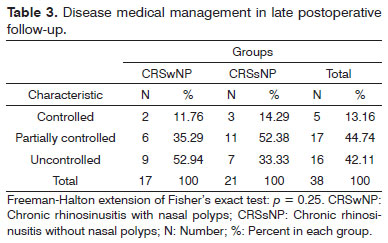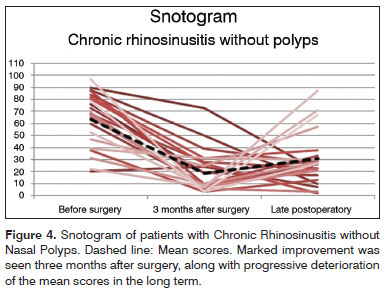Chronic rhinosinusitis (CRS) significantly affects patient quality of life. Medical and surgical treatments aim to clinically manage the condition. OBJECTIVE: To assess the long-term quality of life and clinical management of CRS in patients submitted to endoscopic sinus surgery. METHOD: This prospective cross-sectional cohort study enrolled 38 patients and looked into the follow-up data of subjects diagnosed with CRS before surgery, three months after surgery, and at least two years after surgery. The Sinonasal Outcome Test 22 (SNOT-22) was used to assess response to treatment and long-term clinical management of the disease. RESULTS: Significant improvements in the SNOT-22 scores were seen between the preoperative (61.3) and postoperative assessments with three (16.9) and 24 (32.3) months. No statistically significant differences were seen when patients with polyps were compared to polyp-free subjects. Few patients were controlled in both groups, and 7.89% of the subjects had revision surgery during the study. CONCLUSION: Endoscopic sinus surgery significantly improved the quality of life of patients with chronic rhinosinusitis. Clinical control of the condition was acceptable, with few patients requiring re-operation within two years of the first surgery.
nasal polyps; natural orifice endoscopic surgery; quality of life; sinusitis; treatment outcome









